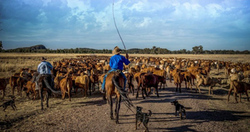
Chinese buyers were denied the bid on S Kidman and Co's Anna Creek, the biggest cattle station in the world.
Chinese investors protest against new crackdown on investment
By Su-Lin Tan and Michael Smith
The Foreign Investment Review Board's decision to increase the level of screening of Chinese companies investing in Australia was unnecessary and a backflip on the promises made in the China-Australia Foreign Trade Agreement (FTA), Chinese investors, private companies and deal makers say.
Both Chinese groups who have either done or yet to do business in Australia were angered by the token "political move" and warned that not only would Chinese investors leave Australia altogether but it would break down the China-Australia trade relationship which Prime Minister Scott Morrison appeared to be repairing.
On Thursday, The Australian Financial Review revealed that Australia's foreign investment regulator no longer believed private companies in China were free of Communist Party control, and planned on subjecting Chinese takeovers and deals to more screening on national security grounds.
Chinese buyers were denied the bid on S Kidman and Co's Anna Creek, the biggest cattle station in the world.
Chinese investors say they support the need for tight security control, but stress vigorous scrutiny is already in place.
Any new rules must be specific to avoid wasted resources, as seen in the snub of Shanghai-based conglomerate Pengxin in the bid for the S Kidman cattle station. After months of work, Pengxin's bid was blocked in 2016.
"New rules need to be clear and ideally applied to every other country Australia trades with. Remember we have an FTA, what's the point of signing it?" a former executive close to the Kidman-Pengxin deal said.
"Australia signed it previously knowing about China and her government and now Australia wants to claw back and apply a new set of rules on to it. There will be potential conflict from that move.
"Security screening was already part of the FTA deal. Why is Australia bringing it up again? How far is a piece of string with 'enhanced screening'?"
Sensitive sectors
His sentiments were echoed by Beijing's China Institute of International Studies' Liu Qing, who also felt the move was against the "spirit" of the FTA.
The FTA, which came into force in 2015, was signed to encourage more trade between the two countries, and in relation to investments generally Australia loosened the screening threshold for private deals in non-sensitive sectors from to $1.094 billion from $252 million.
For sensitive sectors such as agricultural land and agribusiness, media, telecommunications and defence-related industries, Australia said it would use lower thresholds and would also continue to screen all direct investments by Chinese state-owned enterprises, regardless of transaction size. This was consistent with other FTAs.
The new screening could test China's Jangho Group's plans to buy medical company Healius, but Chen Hong, the director of the Australian Studies Centre at Shanghai's East China Normal University, cautioned Australia not to overdo its scrutiny.
"The Chinese middle class want higher standards. We should never distort the purpose of these deals," he said.
All of this is part of Australia's "politicising on Chinese investments", particularly with the ban on Huawei's participation in the roll-out of Australia's 5G wireless network, Mr Liu added.
"The Huawei rejection has hurt Chinese companies severely, now the FIRB decision will cut a new wound while the old wound has not yet healed," he said.
"Even if Huawei is not innocent, 99 per cent of private Chinese companies are innocent," ASX-listed OneAll's chief financial officer Richard Yang said. Outdoor furniture manufacturer OneAll is a company backed by Chinese capital, now listed on the ASX.
"Some investors will feel it's just too hard to invest in Australia and go to other countries or go back to just buying raw material from Australia.
"Others will think it's an over-reaction. There's just no return in investment in playing the anti-China game."
State funds
Accounting partner Jack Zhang, who runs a professional club for qualified Chinese accountants with the aim of increasing the exchange of professional services, says FIRB's move is akin to a "cold war on imports".
"With such a mindset, Australia should just stop importing all Chinese-made goods whether they are trains, planes or laptops," he said.
"Widely used computer brand Lenovo is Chinese owned. Should we all stop using Lenovo? I see many banks and government agencies using Lenovo."
While Chinese investors disagree with FIRB's move, they are not contesting the Chinese government has a hand in many key investments.
"I can assure you significant deals such as those involving resources or technology are almost always backed by state funds with some kind of political interest," a private equity dealmaker in Shanghai said. "But to say there is influence in all other sectors is just nonsense."
Big Chinese-backed groups already present in Australia such as property developers and resource companies either declined to comment or did not respond.
One developer, however, was concerned it could affect approvals for the acquisition of "normal" housing development sites.













